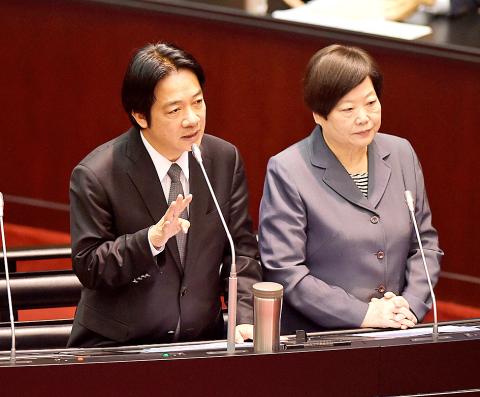Legislators across party lines yesterday criticized the Cabinet’s draft amendments to the Labor Standards Act (勞動基準法), saying that the government risks undoing improvements it has made on workers’ rights by reintroducing poor work conditions.
During a question-and-answer session at the legislature in Taipei, Democratic Progressive Party (DPP) Legislator Chiang Yung-chang (江永昌) asked Premier William Lai (賴清德) to clarify the reason behind the proposed amendments.
The act was amended only 11 months ago, Chiang said, expressing concern that the proposed amendments would harm workers’ rights.

Photo: Huang Yao-cheng, Taipei Times
Lai said that the aim of the amendments is to create a “safe and flexible” work environment for employees, but Chiang said that the premier was being too optimistic.
Average work hours in Taiwan fell three places from third to sixth in the world last year from 2014, Chiang said, asking whether the government wants to abolish the stance it adopted for last year’s amendment — to defend workers’ weekly two days off by raising overtime rates.
If the government wants to help businesses cut operating costs, it can grant them tax reductions, rather than changing the act again, he said.
However, Lai dismissed Chiang’s comment, saying that the key objective of the proposed amendment is to allow more flexibility in labor policies, which cannot be achieved through tax cuts.
KMT Legislator Chen Yi-min (陳宜民) asked Lai whether the amendments will cause the “one fixed day off, one flexible rest day” policy to become a mere justification for canceling seven national holidays.
If so, the amendment would contradict President Tsai Ing-wen’s (蔡英文) campaign promise that the holidays “will not be canceled if it is against workers’ interests,” Chen said.
Saying that netizens have launched a formal online petition to reinstate the holidays, he asked Lai to clarify his stance on the issue, to which the premier responded: “We are still gathering public opinion on this.”
The draft amendments covered by the media this week have drawn criticism that the government is pandering to employers over a rule that, if passed, would allow employers to make employees work 12 days in a row before giving them a two-day break, Chen said.
Meanwhile, KMT Legislator Chiang Wan-an (蔣萬安) on the sidelines of a radio interview said that it is “highly unlikely” that the DPP would reintroduce the seven holidays, which were axed by the party with a “hardline stance” during legislative reviews last year.
Chiang Wan-an, who heads a KMT caucus task force responsible for formulating policies on labor policy amendments, said the caucus supports draft amendments that calculate overtime fees by the actual amount of time employees work, rather than in blocks of four hours.
The caucus also supports proposals by the Ministry of Labor that would allow workers to pass on their annual leave to the next year if it is not used by the end of a year, and to convert remaining compensatory days off into salary payments, he said.
However, it will firmly oppose the draft amendments that would allow employees to work 12 days in a row and reduce the minimum time between shifts from at least 11 to eight hours, Chiang Wan-an said.

The Central Weather Administration (CWA) today issued a sea warning for Typhoon Fung-wong effective from 5:30pm, while local governments canceled school and work for tomorrow. A land warning is expected to be issued tomorrow morning before it is expected to make landfall on Wednesday, the agency said. Taoyuan, and well as Yilan, Hualien and Penghu counties canceled work and school for tomorrow, as well as mountainous district of Taipei and New Taipei City. For updated information on closures, please visit the Directorate-General of Personnel Administration Web site. As of 5pm today, Fung-wong was about 490km south-southwest of Oluanpi (鵝鑾鼻), Taiwan's southernmost point.

Tropical Storm Fung-Wong would likely strengthen into a typhoon later today as it continues moving westward across the Pacific before heading in Taiwan’s direction next week, the Central Weather Administration (CWA) said. As of 8am, Fung-Wong was about 2,190km east-southeast of Cape Oluanpi (鵝鑾鼻), Taiwan’s southernmost point, moving westward at 25kph and possibly accelerating to 31kph, CWA data showed. The tropical storm is currently over waters east of the Philippines and still far from Taiwan, CWA forecaster Tseng Chao-cheng (曾昭誠) said, adding that it could likely strengthen into a typhoon later in the day. It is forecast to reach the South China Sea

Almost a quarter of volunteer soldiers who signed up from 2021 to last year have sought early discharge, the Legislative Yuan’s Budget Center said in a report. The report said that 12,884 of 52,674 people who volunteered in the period had sought an early exit from the military, returning NT$895.96 million (US$28.86 million) to the government. In 2021, there was a 105.34 percent rise in the volunteer recruitment rate, but the number has steadily declined since then, missing recruitment targets, the Chinese-language United Daily News said, citing the report. In 2021, only 521 volunteers dropped out of the military, the report said, citing

Nearly 5 million people have signed up to receive the government’s NT$10,000 (US$322) universal cash handout since registration opened on Wednesday last week, with deposits expected to begin tomorrow, the Ministry of Finance said yesterday. After a staggered sign-up last week — based on the final digit of the applicant’s national ID or Alien Resident Certificate number — online registration is open to all eligible Taiwanese nationals, foreign permanent residents and spouses of Taiwanese nationals. Banks are expected to start issuing deposits from 6pm today, the ministry said. Those who completed registration by yesterday are expected to receive their NT$10,000 tomorrow, National Treasury